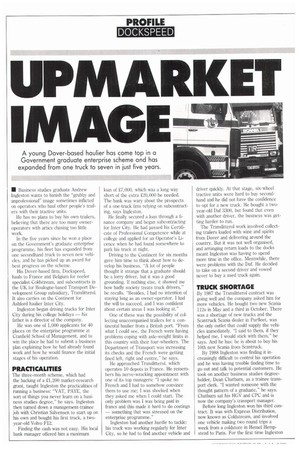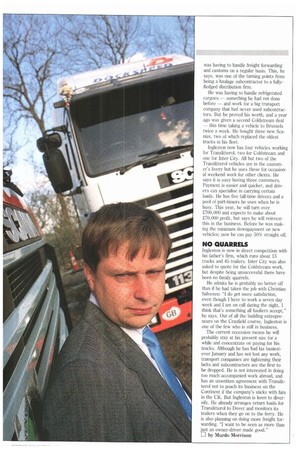UPMARKET IVIALG
Page 80

Page 81

If you've noticed an error in this article please click here to report it so we can fix it.
A young Dover-based haulier has come top in a Government graduate enterprise scheme and has expanded from one truck to seven in just five years.
• Business studies graduate Andrew Ingleston wants to banish the "grubby and unprofessional" image sometimes inflicted on operators who haul other people's trailers with their tractive units.
He has no plans to buy his own trailers, believing that there are too many owneroperators with artics chasing too little work.
In the five years since he won a place on the Government's graduate enterprise programme, his fleet has expanded from one secondhand truck to seven new vehicles, and he has picked up an award for best progress on the scheme.
His Dover-based firm, Dockspeed, hauls to France and Belgium for reefer specialist Coldstream, and subcontracts in the UK for Boulogne-based Transport Development Group subsidiary, Translitterol. It also carries on the Continent for Ashford haulier Inter City.
Ingleston began driving trucks for Inter City during his college holidays — his father is a director of the company.
He was one of 1,000 applicants for 40 places on the enterprise programme at Cranfield School of Management, and to win the place he had to submit a business plan explaining how he had already found work and how he would finance the initial stages of his operation.
PRACTICALITIES
The three-month scheme, which had the backing of a 2,200 market-research grant, taught Ingleston the practicalities of running a business: "VAT, PAYE, the sort of things you never learn on a business studies degree," he says. Ingleston then turned down a management-trainee job with Christian Salvensen to start up on his own and bought his first truck, a twoyear-old Volvo F12.
Finding the cash was not easy. His local bank manager offered him a maximum loan of £7,000, which was a long way short of the extra £20,000 he needed. The bank was wary about the prospects of a one-truck firm relying on subcontracting, says Ingleston.
He finally secured a loan through a finance company and began subcontracting for Inter City. He had passed his Certificate of Professional Competence while at college and applied for an Operator's Licence when he had found somewhere to park his truck at night.
Driving to the Continent for six months gave him time to think about how to develop his business. "A lot of people thought it strange that a graduate should be a lorry driver, but it was a good grounding. If nothing else, it showed me how badly society treats truck drivers," he recalls. "Besides, I had no intention of staying long as an owner-operator. 1 had the will to succeed, and I was confident about certain areas 1 was looking at."
One of these was the possibility of collecting unaccompanied trailers for a continental haulier from a British port. "From what I could see, the French were having problems coping with axle-weight limits in this country with their four-wheelers. The Department of Transport was increasing its checks and the French were getting fined left, right and centre," he says.
He approached Translitterol, which operates 10 depots in France. He remembers his nerve-wracking appointment with one of its top managers: "1 spoke no French and I had to somehow convince them to use me; I was shocked when they asked me when I could start. The only problem was I was being paid in francs and this made it hard to do costings — something that was stressed on the enterprise programme."
Ingleston had another hurdle to tackle: his truck was working regularly for Inter City, so he had to find another vehicle and driver quickly. At that stage, six-wheel tractive units were hard to buy secondhand and he did not have the confidence to opt for a new truck. He bought a twoyear-old Daf 3300, but found that even with another driver, the business was getting harder to run.
The Translitterol work involved collecting trailers loaded with wine and spirits from Dover and delivering around the country. But it was not well organised, and arranging return loads to the docks meant Ingleston was having to spend more time in the office. Meanwhile, there were problems with the Daf. He decided to take on a second driver and vowed never to buy a used truck again.
TRUCK SHORTAGE
By 1987 the Translitterol contract was going well and the company asked him for more vehicles. He bought two new Scania 112s in May and a third in October. There was a shortage of new trucks and the Scantruck Scania dealer in Purfleet, was the only outlet that could supply the vehicles immediately. "I said to them, if they helped me, I would stick with them," he says. And he has: he is about to buy his 10th new Scania from Scantruck.
By 1988 Ingleston was finding it increasingly difficult to control his operation and he was having trouble finding time to go out and talk to potential customers. He took on another business studies degreeholder, Dean Chatburn, as a trainee transport clerk. "I wanted someone with the thought pattern of a graduate," he says. Chatburn sat his HGV and CPC and is now the company's transport manager.
Before long Ingleston won his third contract. It was with Express Distribution, now known as Coldstream, and involved one vehicle making two round trips a week from a coldstore in Hemel Hempstead to Paris. For the first time Ingleston
was having to handle freight forwarding and customs on a regular basis. This, he says, was one of the turning points from being a haulage subcontractor to a fullyfledged distribution firm.
He was having to handle refrigerated cargoes — something he had not done before — and work for a big transport company that had never used subcontractors. But he proved his worth, and a year ago was given a second Coldstream deal — this time taking a vehicle to Brussels twice a week. He bought three new Scanias, two of which replaced the oldest trucks in his fleet.
Ingleston now has four vehicles working for Translitterol, two for Coldstream and one for Inter City. All but two of the Translitterol vehicles are in the customer's livery but he uses these for occasion-al weekend work for other clients. He says it is easy having three customers. Payment is easier and quicker, and drivers can specialise in carrying certain loads. He has five full-time drivers and a pool of part-timers he uses when he is busy. This year, he will turn over 2700,000 and expects to make about 270,000 profit, but says he will reinvest this in the business. Before he was making the minimum downpayment on new vehicles; now he can pay 50% straight off.
NO QUARRELS
Ingleston is now in direct competition with his father's firm, which rims about 15 trucks and 45 trailers. Inter City was also asked to quote for the Coldstream work, but despite being unsuccessful there have been no family quarrels.
He admits he is probably no better off than if he had taken the job with Christian Salvesen: "I do get more satisfaction, even though I have to work a seven day week and I am on call during the night. I think that's something all hauliers accept," he says. Out of all the budding entrepreneurs on the Cranfield course, Ingleston is one of the few who is still in business.
The current recession means he will probably stay at his present size for a while and concentrate on paying for his trucks. Although he has had his busiestever January and has not lost any work, transport companies are tightening their belts and subcontractors are the first to be dropped. He is not interested in doing too much accompanied work abroad, and has an unwritten agreement with Translitterol not to poach its business on the Continent if the company's sticks with him in the UK. But Ingleston is keen to diversify. He already arranges return loads for Translitterol to Dover and monitors its trailers when they go on to the ferry. He is also planning on doing more freight forwarding. "I want to be seen as more than .jit an owner-driver made good." II by Murdo Morrison




































































































































































